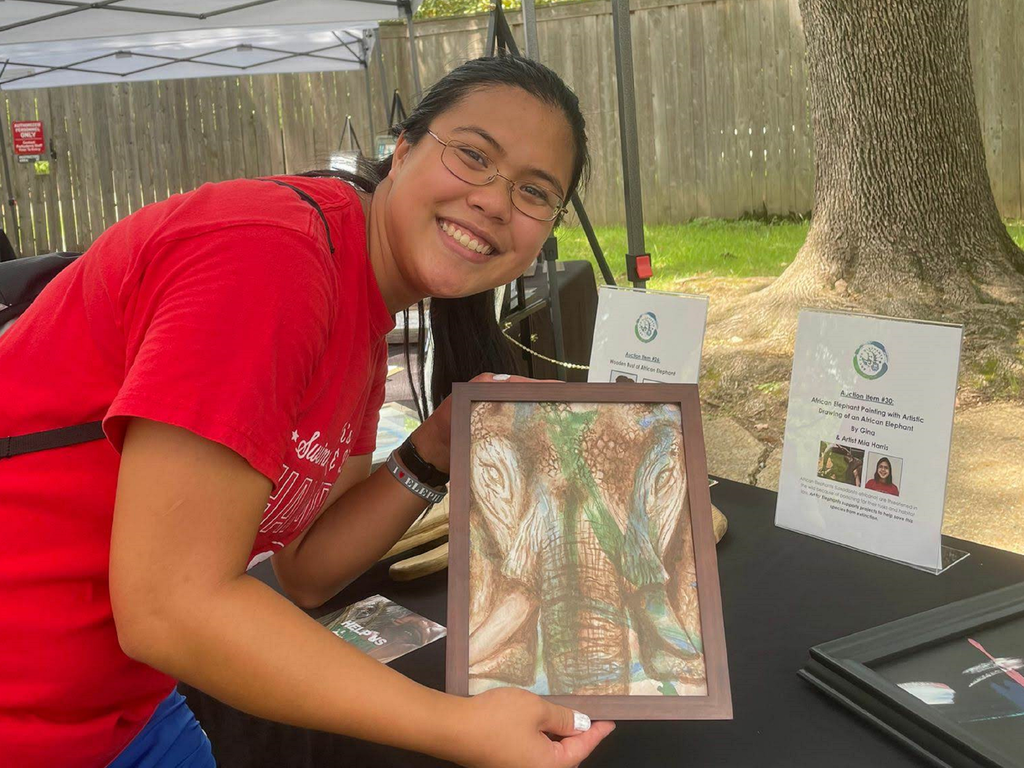Mia Harris ’23, a biology major from Hermitage, TN, got to have a unique experience this summer as an Animal Behavior and Conservation Fellow at the Memphis Zoo. As part of this Rhodes fellowship, she was involved in daily behavioral data collection on four female African elephants. Harris became interested in the zoo’s art enrichment activities for animals and was provided with an art piece painted by Gina, matriarch of the zoo’s African elephant herd. Harris then painted around Gina’s work to create the face of Tyranza, who was the herd’s previous matriarch and the oldest female elephant in North America when she passed away in 2020 at age 56.
“Due to the COVID-19 pandemic precautions, I was unable to participate with Gina in her practice paint sessions, but I received some of her art to work with. Diluting acrylic paint with water to make translucent paint strokes like those made with watercolor paints, I painted Tyranza without hiding Gina’s blue and green paint strokes. I wanted both the past and present matriarchs to be present in this piece, because they both loved to paint and create.”
Art enrichment is used by zoos to increase the mental and physical stimulation of animals. The African elephants at the Memphis Zoo paint with brushes as well as with their own trunks. A zookeeper can apply nontoxic paint drops on a canvas and then hold it in front of the elephant to swirl, drag, dab, and play with the pigment colors.
“After a set of paint strokes is applied, the zookeeper will reward the elephant with a treat. Participation in enrichment programs is not required by any captive individual,” says Harris. “Gina prefers to paint with her trunk.”
The Mia-Gina collaboration piece sold for $50 in a Memphis Zoo fundraiser benefitting Elephants for Africa, a nonprofit organization in Botswana that focuses on saving the species from extinction and mitigating human-elephant conflict. Elephants in the wild are threatened by poachers hunting them for their ivory tusks.
“Gina has a single tusk, but she is the sassiest and most dominant character of the Memphis Zoo elephant herd,” says Harris. “Even though she is constantly running the show, Gina has her sweet moments with her herd members and zookeepers.”
Supervised by Dr. Sarah Boyle, associate professor of biology at Rhodes, the Animal Behavior and Conservation Fellowship familiarizes students with the evolutionary, neural, and environmental behavior of animals. They work with the Memphis Zoo staff to implement experiments to test hypotheses relating to animal behavior and use statistical analyses appropriate to the experiment’s design. Fellows also learn how to effectively communicate findings verbally and in written formats.
“One of the many things that I learned about elephant conservation is the critical role that zoos play in discovering and sharing information about elephants,” says Harris. “Rhodes and the Memphis Zoo have a partnership that involves studying the relationships among the herd and choices made by individual animals. The work is then applied to healthcare and routine check-ups. If the health of the herd increases under specific conditions coupled with specific behaviors, this information can be used by other zoos and facilities to tend to their herds. On a much larger scale, the accumulation of behavioral and health data from the global zoo network can be used to protect wild elephant herds. If the behavioral and health patterns of the wild elephants overlap with those found in captive elephants, conservationists have a greater understanding of the natural phenomenon that they are observing. Then this shared knowledge can be applied to local policies, the preservation of sanctuary lands, and saving the wild elephant community. Small things add up in vast communities.”
Boyle, who also is chair of the environmental studies and science program at Rhodes, conducts research addressing the extent to which a species modifies its behavior when living in areas of high disturbance. She has conducted research in Central and South America.
“There are many benefits to having Professor Boyle as a teacher, mentor, and peer,” says Harris. “Her patience is endless. She understands the work that we do is tedious and occasionally overwhelming. She also understands the people behind the work. The students that she works with in this fellowship are talented, hard-working, and incredible individuals. However, we are also young individuals who are still learning. Regardless of whether we fall or soar, she is always present with us in our journey. Her steady presence has given me more patience with myself and the research process.”
